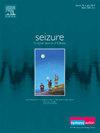睡眠障碍对癫痫患者生活质量的影响
IF 2.7
3区 医学
Q2 CLINICAL NEUROLOGY
引用次数: 0
摘要
目的探讨中国西部地区癫痫患者睡眠障碍的患病率及其对生活质量的影响。方法采用癫痫-31量表(QOLIE-31)、失眠严重程度指数(ISI)、STOP-BANG问卷、Epworth嗜睡量表(ESS)、匹兹堡睡眠质量指数(PSQI)、中文版癫痫神经障碍抑郁量表(CNDDI-E)和广泛性焦虑症-7 (GAD-7)对年龄≥14岁的PWE进行生活质量评估。评估睡眠障碍、抑郁和焦虑对PWE患者QOLIE-31评分各方面的影响。结果共入组458例PWE。平均QOLIE-31评分为51.27±9.69。相关评估量表显示,10.3%的患者存在失眠,12.9%的患者存在阻塞性睡眠呼吸暂停(OSA)高风险,33.0%的患者存在白天嗜睡(EDS), 48.0%的患者存在睡眠不良,46.3%和36.5%的患者存在抑郁和焦虑。逐步多元线性回归分析显示,抑郁症(β=-0.638, 95% CI:0.876 ~ -0.401, p <;0.05)、焦虑(β= -0.508,95% CI: 0.708∼-0.307,p & lt;0.05)、EDS(β=-0.210, 95% CI:0.364 ~ -0.057, p = 0.007)、抗癫痫药物(ASMs)(β=-1.268, 95% CI:2.318 ~ -0.217, p = 0.018)、失眠(β=-0.161, 95% CI:0.292 ~ -0.030, p = 0.016)和癫痫发作频率(β=-0.570, 95% CI:1.129 ~ -0.011, p = 0.046)是影响PWE患者QOLIE-31总分的主要因素。结论西部地区PWE存在较高的睡眠障碍,尤其是失眠、OSA和EDS,显著降低了PWE的生活质量。解决睡眠和精神障碍可能会改善PWE的总体生活质量。本文章由计算机程序翻译,如有差异,请以英文原文为准。
The impact of sleep disorders on quality of life in patients with epilepsy
Objective
We aimed to explore the prevalence of sleep disorders and their impact on the quality of life (QoL) in patients with epilepsy (PWE) in western China.
Methods
This cross-sectional study included PWE aged ≥14 years who were assessed using QoL in epilepsy-31 inventory (QOLIE-31), Insomnia Severity Index (ISI), STOP-BANG questionnaire, Epworth sleepiness scale (ESS), Pittsburgh sleep quality index (PSQI), Chinese version of Neurological Disorders Depression Inventory for Epilepsy (C![]() NDDI-E) and Generalized Anxiety Disorder-7 (GAD-7). The impact of sleep disorders, depression and anxiety on all aspects of QOLIE-31 scores in PWE were assessed.
NDDI-E) and Generalized Anxiety Disorder-7 (GAD-7). The impact of sleep disorders, depression and anxiety on all aspects of QOLIE-31 scores in PWE were assessed.
Results
A total of 458 PWE were enrolled. Mean QOLIE-31 score was 51.27±9.69. Relevant assessment scales showed that 10.3 % of the patients suffered from insomnia, 12.9 % of the cohort had a high risk of obstructive sleep apnea (OSA), 33.0 % of the patients had excessive daytime sleepiness (EDS), 48.0 % of the patients reported poor sleep, while 46.3 % and 36.5 % of the patients reported depression and anxiety, respectively. The stepwise multivariate linear regression analysis highlighted that depression(β=-0.638, 95 %CI:0.876∼-0.401, p < 0.05), anxiety(β=-0.508, 95 %CI:0.708∼-0.307, p < 0.05), EDS(β=-0.210, 95 % CI:0.364∼-0.057, p = 0.007), number of antiseizure medications (ASMs)(β=-1.268, 95 % CI:2.318∼-0.217, p = 0.018), insomnia(β=-0.161, 95 % CI:0.292∼-0.030, p = 0.016) and seizure frequency(β=-0.570, 95 % CI:1.129∼-0.011, p = 0.046) were the main factors that influenced the total score of QOLIE-31 in PWE.
Conclusions
PWE showed a high prevalence of sleep disorders, especially insomnia, OSA and EDS, which significantly reduced the QoL of PWE in western China. Addressing sleep and psychiatric disorders might improve the overall QoL of PWE.
求助全文
通过发布文献求助,成功后即可免费获取论文全文。
去求助
来源期刊

Seizure-European Journal of Epilepsy
医学-临床神经学
CiteScore
5.60
自引率
6.70%
发文量
231
审稿时长
34 days
期刊介绍:
Seizure - European Journal of Epilepsy is an international journal owned by Epilepsy Action (the largest member led epilepsy organisation in the UK). It provides a forum for papers on all topics related to epilepsy and seizure disorders.
 求助内容:
求助内容: 应助结果提醒方式:
应助结果提醒方式:


